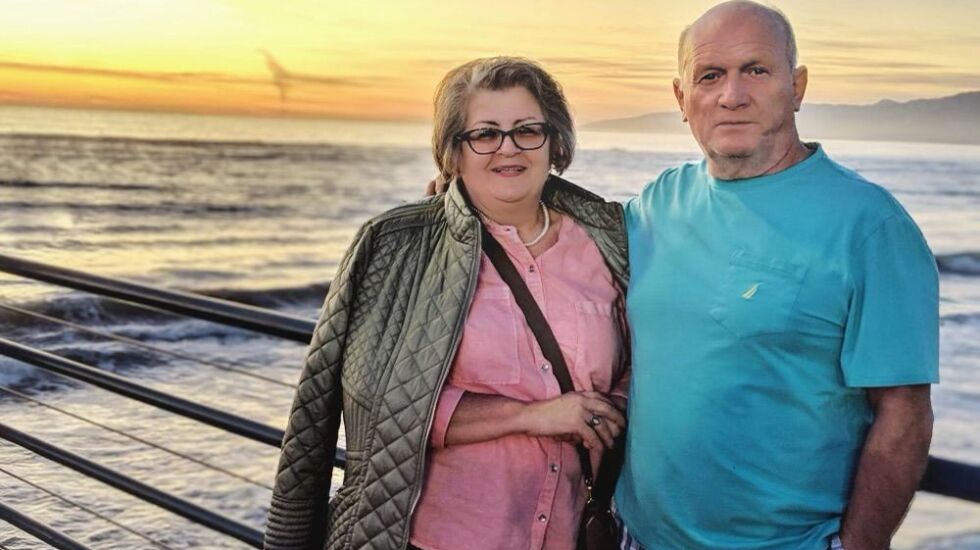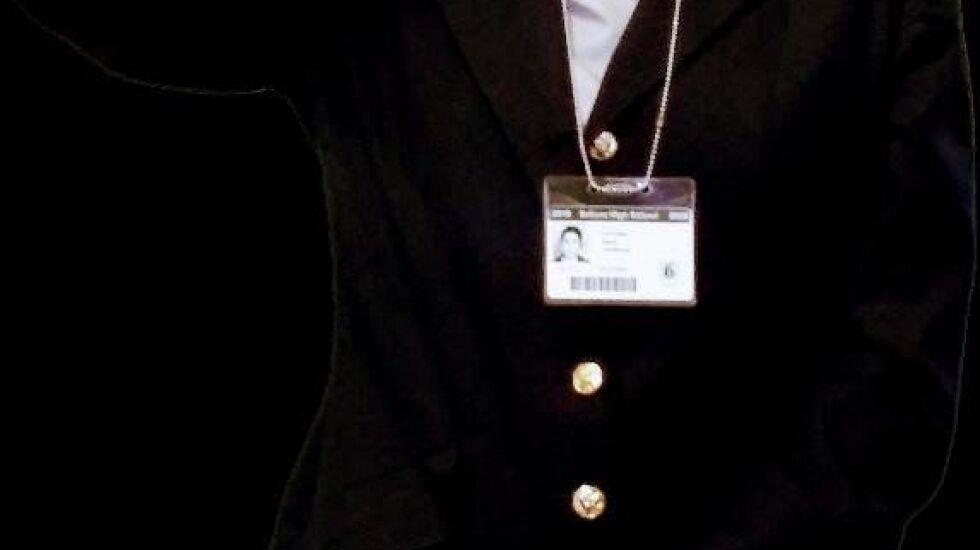
Rasim Katanic was a refugee from the Bosnian War who told stories of visiting gymnasiums filled with bodies in a vain search for his brother.
Iman Al-Sarraj, just 18, also had immigrant roots, but had lost touch with her father who kept hoping she would come back.
Their lives are now linked by murder.
Chicago police are investigating whether the same man is responsible for their deaths, Brandon Sanders, who was previously arrested in Montana and accused of forcing his wife into prostitution.
Sanders has so far been charged with stabbing Katanic to death in May after a chance encounter on the roof of a restaurant in West Ridge. He hasn’t been charged with the murder of Al-Sarraj, whose beaten body was found in a refrigerator in Sanders’ West Ridge apartment early this month.

Police say the investigation is continuing, and sources told the Sun-Times detectives will likely look into similar missing persons cases, given Sanders’ history in Montana.
“I’m hoping it’s just these two bodies,” Katanic’s daughter, Aida Sutardio, said. “It’s just been a devastating loss that we’re still trying to process as a family.”
Al-Sarraj’s father said he had never given up hope of seeing his daughter again. “They did not give her a chance,” Khalil Sarraj said. “Nobody has the right to do that.”
‘Increasing violence’
As detectives investigated Sanders, they learned of his arrest at a Motel 6 in Great Falls, Montana, on Aug. 14, 2019. An employee had reported seeing him sitting in the parking lot while his wife “entertained multiple male guests” in a room, court records show.
His wife told investigators she came to the United States from Germany to attend college and was “very naive” when she met Sanders, who she said encouraged her to become a sex worker and used “extreme violence” to keep her in line.
Sanders was charged with human trafficking and aggravated promotion of prostitution, records show. He was later charged with witness tampering after he and people close to him allegedly began intimidating and harassing his wife, who was in protective custody and eventually went home to Germany.
She told a detective that she began dating Sanders in 2018 while attending college in Chicago, and “he convinced her to try prostitution as a way for them to make easy money,” according to court records.
Sanders “resorted to increasing violence to force her to stay in prostitution,” including choking her in front of a hotel mirror, the records show. She told investigators Sanders got her hooked on cocaine, which she said she used to “make it through meetings with clients.”
But Sanders’ trial was delayed because his wife “was refusing to travel to the United States because of COVID-19 risk,” according to court records. He was released on his own recognizance, and the case was eventually dropped when the judge would not allow her to testify virtually.
“Besides the pandemic being a big reason for this, I also don’t feel emotionally ready to face all of these things in a courtroom,” she said in an email to a prosecutor. “I also do not want to see Brandon.”
Joshua Racki, a prosecutor in the case, said Sanders faced around 25 years in prison but would likely have been given a lighter sentence of roughly 10 years if he had been convicted.
“I wish we would’ve been able to get him,” Racki said. “But with the judge making that ruling, that’s where we were at.”
Sanders already had a record in Chicago. He had pleaded guilty to hiding in the back seat of an ex-girlfriend’s car in 2016 and choking her from behind, then sending her threatening text messages, court records show.
Sanders’ next run-in with Chicago police was early on Jan. 1 this year when he was kicked out of the Electric Hotel Nightclub at 222 W. Ontario St. “due to being irate,” according to an arrest report.
As a manager escorted him out of the club, Sanders threatened to retrieve a gun from his car, then shoved the manager, according to the report. He was charged with misdemeanor assault and battery.
“I was scared s---less of this guy,” the manager said. “He was as pissed off as someone could be.”
The charges were dropped during Sanders’ first court hearing later that month.

‘Acting erratically’
Then on the afternoon of May 12, Sanders took a fateful stroll through the “Little India” area of West Ridge, according to prosecutors .
He stopped at the Hanmi Bank, 6335 N. Western Ave., where he began “acting erratically” around 2:20 p.m. while trying to open an account, prosecutors said. He called the FBI’s National Threat Operations Center and reported “a plot to overthrow the government,” prompting an employee to call the police.
He left before the cops showed up and went to a shoe store at Devon and Western avenues, walking through a back room to a rear courtyard, prosecutors said. Surveillance footage shows him lingering in the courtyard around 4 p.m., then climbing a stairwell to an adjacent rooftop where Katanic was working on a cooler compressor.
Katanic was later found stabbed to death.
The following day, two recent graduates from Loyola University Chicago reported a burglary at their apartment at Devon and Western, prosecutors said. Sanders had unscrewed a skylight using Katanic’s screwdriver, then shaved in a bathroom, switched out his clothing and left behind a smattering of evidence, according to prosecutors.
Katanic’s wallet was left on a table, Sanders’ Timberland boots were placed in the oven, and a water jug with Sanders’ DNA was found on the stove, prosecutors said. The screwdriver and a hair trimmer were placed atop a mailbox in front of the building.
Surveillance footage showed Sanders leaving shortly before 6 p.m., wearing some of the stolen clothing with Katanic’s keys hanging from his waistband, prosecutors said. He then walked to a furniture store in the 2700 block of West Devon Avenue where he previously worked.
Sanders encountered his uncle, who said he was acting erratically and called the store owner for help, prosecutors said. When the owner arrived, Sanders told him he no longer had to pay rent “because his landlord was on the roof and he took care of that.”
He ultimately made his way to Evanston, where he flagged down a cop and asked to be taken to a hospital, prosecutors said.
He was arrested on June 29 and charged in the killing, along with felony counts of robbery and burglary. At his bail hearing, Sanders’ attorney said “there are some issues with a mental state.” He remains held without bail.
On the same day that he appeared in court, police searched his apartment and found Al-Sarraj’s body.

A tragic life
Katanic’s daughter, Aida Sutardio, said she is having a hard time grasping “that he was slaughtered on top of a roof.”
“Do we ever process it? Do we ever figure out how to move forward from this or what that collectively means for us?” she asked.
While Katanic lived a full life, Sutardio said it was defined by tragic events.
During the Bosnian War in the 1990s, he spent months hiding in the woods from Serbian soldiers, Sutardio said. After his brother went missing, he traveled to gymnasiums where remains from mass graves were brought, hoping to find his brother’s body or belongings.
He never did.
“I think that really broke down my dad quite a bit,” his daughter said. “And that’s how we ended up in America.”
Katanic took English courses, became a licensed contractor and served as the primary caretaker of his two daughters because his wife worked nights. He pushed them to get educated, work hard and keep their loved ones close.
He retired at 66 but continued doing maintenance work for longtime clients of his heating, ventilation and air conditioning business. That included Tahoora Sweets & Bakery, 2345 W. Devon Ave., where he was killed.
“We never thought that this is how his life would end,” Sutardio said. “Living in Chicago, you hear about [violence], you read about it. You just never think that you would become a part of the statistic.”
In a haunting coincidence, Sutardio said she learned that Al-Sarraj’s body was found in Sanders’ apartment from a family member who lives nearby.
She questioned why Sanders was free at the time.
“I feel like every step of the way through the system, his crimes kept getting bigger until it ends with two dead people,” Sutardio said. “And I think that just reflects how inconsistent our system is and how many holes there are.”

A heartbreaking call
Khalil Sarraj was driving a taxi in downtown Chicago when police called him early this month.
The officer told Sarraj they needed to meet. After asking why, Sarraj suddenly realized what it was about: “Oh my God, please, I started crying. Is she OK? Is she alive? Is she dead?”
The officer told him his daughter had been murdered.
Al-Sarraj was born in Chicago after Sarraj came to the United States from Israel. Al-Sarraj’s mother is originally from Yugoslavia.
“My heart is shattered in a million pieces,” he said. “I will never, ever have a normal life, especially after I saw my daughter’s face and what the monster did to her.”
Every day he visits Al-Sarraj’s grave. “I pray for her soul.”
Sarraj and his wife, Arnetia Seals, detailed Al-Sarraj’s short, turbulent life.
She grew up on the Northwest Side with her mother, who took her out of school around third or fourth grade, Sarraj said. Still, he and his wife were able to enroll her at Schurz High School in Irving Park as a freshman.
She joined the Reserve Officer Training Corps and began acclimating to a more normal life.
“She lost so many years,” Sarraj said, “but she was doing well.”
Despite his efforts to “put all the pieces together,” Al-Sarraj ran away about a year later.
Her mother contacted Sarraj at one point and told him their daughter wanted to move back with him, but Al-Sarraj insisted her mom was “lying” and that she was happy where she was.
Last August, Sarraj texted his daughter because his brother was in town from Israel and wanted to see her.
“I don’t want to see anybody,’’ she texted back.
That was the last communication she had with her father.








